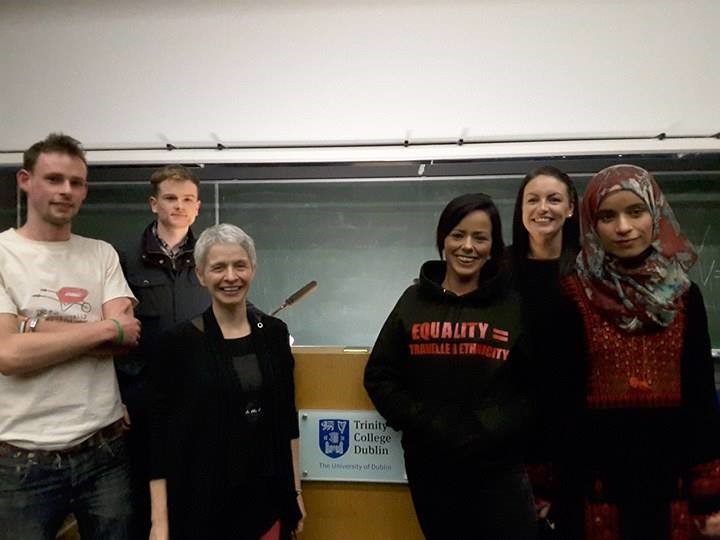On Tuesday evening Students for Justice in Palestine and SUAS hosted a panel discussion and Q&A in order to address the importance of “Education, Equality and Activision”. The evening was chaired by Dr Gilian Wylie of the Irish School of Ecumenics and included three talks from Malaka Mohammed, Erica Fleming and Eileen Flynn. Each of the speakers referenced their diverse life experiences in accessing education and their beliefs that education should be more accessible to all..
Palestinian campaigner Malaka Mohammed opened the talks with her experiences in trying to leave the harsh life she had been subjected to in Gaza. Due to the Israeli occupation, Mohammed argued, students in Gaza are subjected to the constant fear of injury, detention or even death. They are constantly under the threat of being denied access to travel and subject to checkpoints. In a huge amount of cases there is such a lack of electricity that girls in education need to finish any work before the sun goes down just so they can have enough light to see their work.
Malaka herself was fortunate and had the opportunity to leave Gaza to stud. After an official statement that Gazan students would not be allowed leave she decided to go to the border and by chance she was the last of 30 people allowed to cross the border out of Palestine. The situation in Gaza is dire, Mohammed reiterated, and Malaka is part of the Boycott, Divestment and Sanctions (BDS) movement. This movement exists with the aim to put political and economic pressure on the Israeli government. She urged everyone in the room along with Students for Justice in Palestine to put pressure on Trinity to end its academic collaboration with Israeli. Malaka is continues to fight for basic human rights in Palestine, which includes access to education for all.
Housing rights activist Erika Fleming provided an emotional insight into how easy it is to fall into a cycle of constantly working and not planning for your future. It is hard to break out of the instant gratification of being suddenly be provided with regular paychecks when you are young. This all came to a halt when she fell pregnant and realised that the day job she had been working was not enough to pay for a child and incoming bills.
Constantly worried about finances with education never even crossing her mind she found herself homeless with her young child even while she was still working. Enraged by this injustice she started a #sidebyside campaign to ask the Irish government to provide affordable housing to the people struck by homelessness.
Last to speak was Eileen Flynn a student in NUI Maynooth and a Traveller activist. Flynn emphasised how even though there may be an increase in access to education there also needs to be support in staying in education and getting the full benefits of it. Growing up in the Travelling community, even though she had an interest in education her father and brothers were more concerned about whether not she would get married rather than if she would be able to get an education. Because of her passion for education she started working as an Education Officer in the Travelling community and joined the National Committee in 2011. This came at one of the most trying times in Ireland as it was the depths of the country’s recession.
Flynn continues to fight to tackle the issues that have not been addressed within her community. Even though 1% is a small amount of people who have been provided with access to education, Flynn argues it is massive improvement for the community that she grew up in. Flynn did however emphasise that “it is is how you deal with the [way] out that is important”, because there is little motivation to actually continue in education.
All of the speakers spoke evocatively and all carried a similar message: everybody should have a right to education. It was each of their personal experiences that pushed them into activism and to constantly fight for what they feel is right. In conversation with Wylie, she said that the message from all of the speakers was extremely important. “I would love to see greater solidarity from the university community for groups who face barriers to entry because of their gender, race, refugee status, sexuality[..].”







